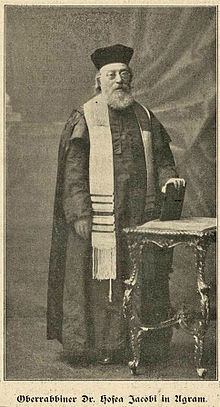Hosea Jacobi
Rabbi Hosea Jacobi | |
|---|---|
 | |
| Personal life | |
| Born | Hosea Hermann Jacoby 1841 |
| Died | 21 May 1924 (aged 84) Zagreb, Kingdom of Yugoslavia, (now Croatia) |
| Nationality | |
| Spouse | Hulda Pander Jacobi |
| Children | Ivan Johan Jacobi Luise Lea Zaloscer Klara Barmaper Recha Barmaper Martha Spitzer Selma Strasser Ivana Johana Jacobi |
| Parent(s) | Mayer and Sara-Miriam (née Goldberg) Jacobi |
| Religious life | |
| Religion | Judaism |
| Denomination | Orthodox Judaism |
Rabbi Dr. Hosea Jacobi (born Hosea Hermann Jacoby; 1841–1925) was Chief Rabbi of Zagreb, Croatia for 58 years and the spiritual and religious leader of the Jewish community in Croatia.[1][2][3]
Biography
[edit]Jacobi was born in Jacobshagen, Kingdom of Prussia (now Poland), the son of the merchant Mayer Jacobi and his wife Sara-Miriam (née Goldberg). His father died when he was ten years old, and his maternal grandfather Rabbi Jacob Moses Goldberg and uncle Rabbi Nachman Abraham Goldberg were his religious instructors.
He attended the Kölnische Gymnasium school in Berlin. A member of the Modern Orthodox Jewish congregation in Berlin, Jacobi was a student of Rabbi Azriel Hildesheimer and Rabbi Elchanan Rosenstein who ordained him. He studied Semitic languages, Hebrew and Theology, in the universities of Berlin and Halle, Saxony-Anhalt (Ph.D. 1865, his dissertation being "De loco feminarum apud Iudaeos antiuissimos maxime matrimonii contrahendi ratione habita" – "The Role of Women in Judaism"). Jacobi married Hulda Pander and had seven children.
In 1867 he became Chief Rabbi of Zagreb, Croatia. Jacobi established and headed, in Zagreb, the Jewish elementary school (Talmud Torah), taught Jewish Studies in high-schools, taught Hebrew and Judaism and established Jewish-Women organizations. He was also active in social welfare projects for the Jewish and General Population in Yugoslavia, for which he was highly respected by the general population and the leaders of other religious denominations. In 1885 Jacobi delivered the first Synagogue-Sermon in the Croat language thus encouraging the integration of Jews into the general population; he also wrote the first ever Jewish-Studies text-books in Croatian.
Jacobi's children: his son Dr. Ivan (Hans, Johanan), his daughters Luise Zaloscer and Klara (Loja) Barmaper and his son-in-law Dr. Hugo Spitzer were among the prominent leaders of the Jewish community and Zionist Movement in Croatia.
Jacobi died in Zagreb and was buried at the Mirogoj Cemetery.[4][5]
Writings
[edit]- Ueber die Stellung des Weibes im Judenthum. Vienna, 1865.
- Worauf haben wir bei der Erziehung unserer Kinder zu achten? (Predigt). Zagreb, 1872.
- Was ist der Talmud? und was hat er für Israel gethan? Zagreb, 1880.
- Dereh Hakodeš, Put Svjetlosti (Derech Hakodesch). Zagreb, 1900.
- Biblijska Povjesnica za izraelsku mladež pučkih i nižih srednjih škola. Zagreb, 1923.
References
[edit]- ^ Snješka Knežević (2011, p. 173)
- ^ Kraus (1998, p. 173)
- ^ (in Croatian) Ha-Kol (Glasilo Židovske zajednice u Hrvatskoj); Aleksander Laslo, Nataša Maksimović Subašić; Graditelji novog Zagreba; stranica 21; broj 108, siječanj / veljača 2009.
- ^ Nikolić, Daniel (2011-02-13). "Zagreb - Mirogoj Cemetery - Hosea Jacobi". Panoramio. Retrieved 2012-05-18.
- ^ (in Croatian) Gradska groblja Zagreb: Hosca Jacobi, Mirogoj Ž-2-I-16
Bibliography
[edit]- Snješka Knežević, Aleksander Laslo (2011). Židovski Zagreb. Zagreb: AGM, Židovska općina Zagreb. ISBN 978-953-174-393-8.
- Kraus, Ognjen (1998). Dva stoljeća povijesti i kulture Židova u Zagrebu i Hrvatskoj. Zagreb: Židovska općina Zagreb. ISBN 953-96836-2-9.
See also
[edit]- 1841 births
- 1925 deaths
- People from Stargard County
- Burials at Mirogoj Cemetery
- Croatian people of German-Jewish descent
- Croatian people of Polish-Jewish descent
- Rabbis from Austria-Hungary
- Chief rabbis of Croatia
- Modern Orthodox rabbis
- German Orthodox rabbis
- People from the Province of Pomerania
- Yugoslav rabbis
- Croatian Orthodox rabbis
